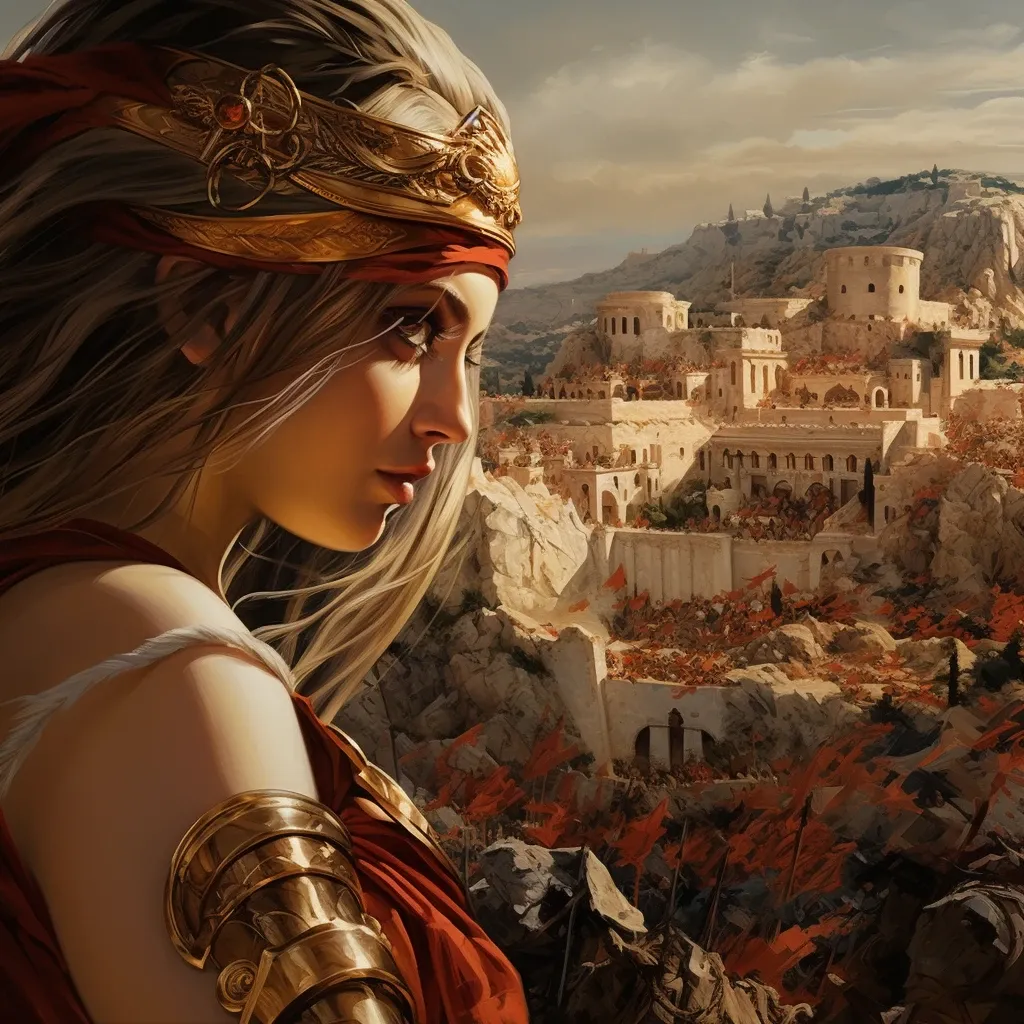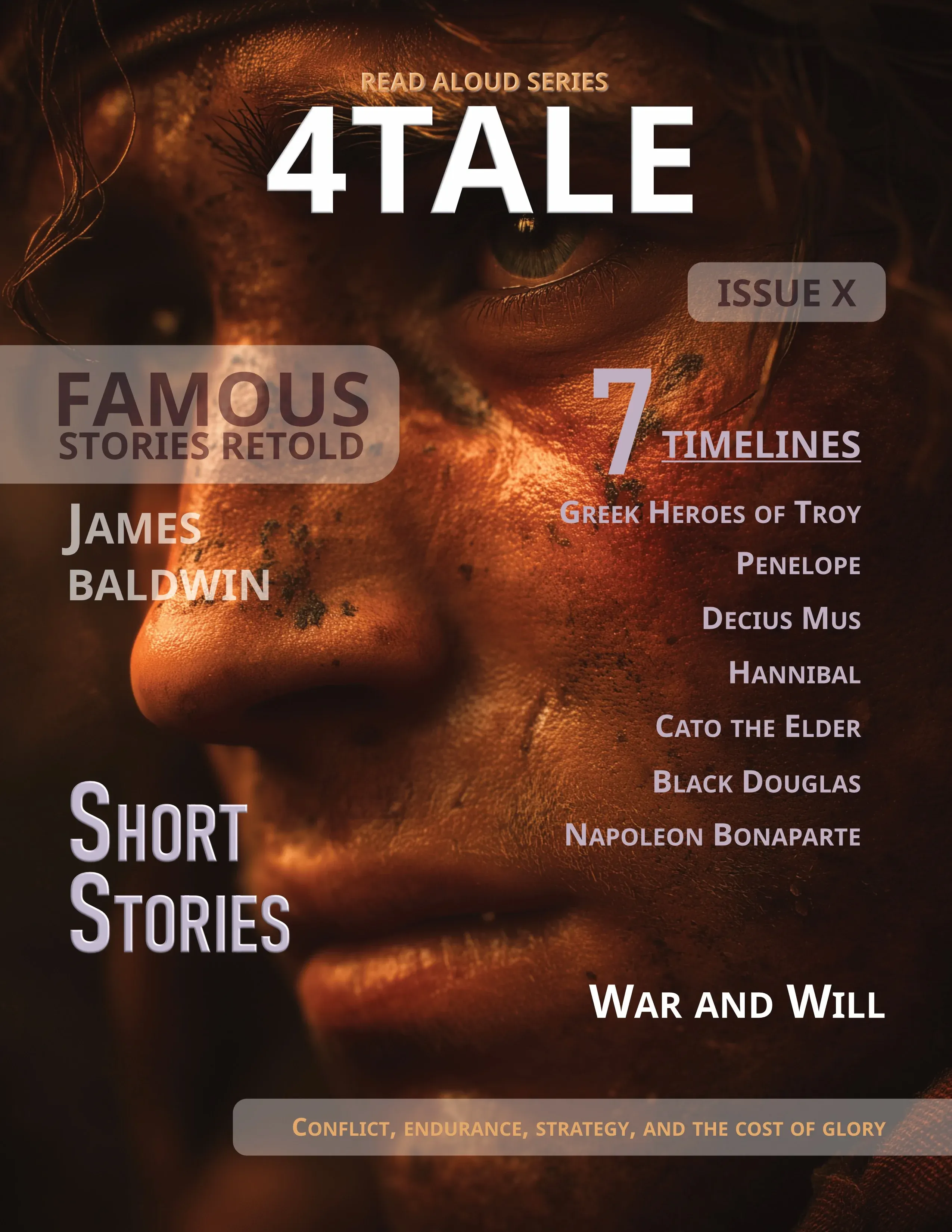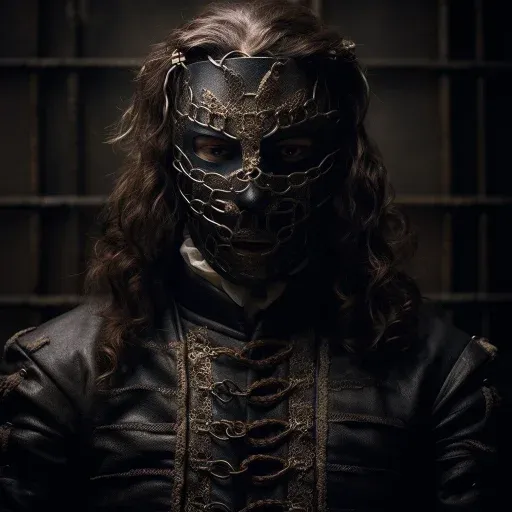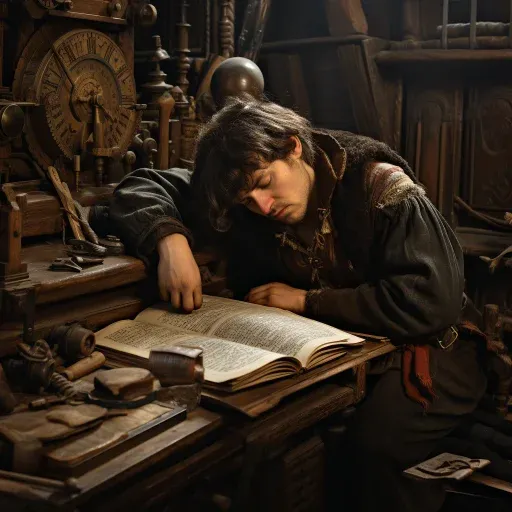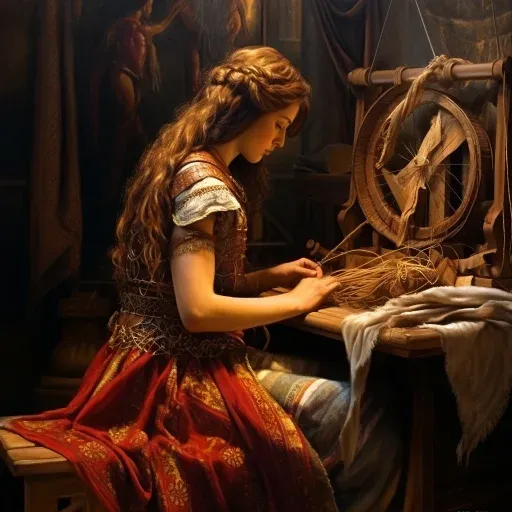I. THE LONG SIEGE
On the farther side of the Ægean Sea there once flourished a fair, rich city, the most famous in the world. This city was called Ilium by its own people, but in story and song it is known as Troy. It stood on a sloping plain some distance back from the shore, and was surrounded by high, strong walls which no enemy could scale or batter down. Within the gates were the homes of the people, houses great and small, a fine stone palace for the king and his sons, and a beautiful temple of Athene, the guardian of the city. Outside the walls were gardens and farms and woodlands; and in the distance rose the green slopes and rocky heights of Mount Ida.
Troy was a very old city. For hundreds of years it had been growing in power and pride, and no man knew when or how the foundations of its greatness had been laid. "Ilium will endure forever," said the boastful Trojans as they looked at its solid walls and its noble buildings. But, alas, sad changes at length took place, and cruel war destroyed many a proud hope.
From beyond the sea came hosts of Greeks, armed for war and bent upon the conquest of the city. They came because one of the princes of Troy, Paris by name, had done a grievous wrong to Greece. He had stolen and carried away from her shores the most beautiful of all her women, even Helen, the wife of Menelaus of Sparta. The cry was for vengeance; and heroes and warriors from every city and town joined hands and vowed vengeance upon Troy. They came in a thousand little ships, with sails and oars, and landed on the beach at the foot of the plain. They built huts and tents along the shore; they kindled fires; they threw up a breastwork of earth and stones around their camp; they defied the warriors of Troy to come out on the plain and meet them in battle.
Thus the siege was begun, and for more than nine years the city was surrounded by determined foes; but the walls were strong, and the men who defended them were brave. Many fierce battles were fought outside of the gates. Sometimes the victory seemed to be with the Greeks, sometimes with the Trojans; but neither could gain any great advantage over the other. The Trojans could not drive the invaders from their shores; the Greeks could not force their way into the city. One hero after another was slain, now on this side, now on that. Great were the losses of besiegers and besieged, and great the suffering and grief; but still the struggle went on.
"Athene protects us," said the hopeful people of Troy. "So long as the Palladium is with us, our city cannot be taken."
The Palladium was a beautiful statue which stood in the temple of Athene. In it the Trojans placed their hopes, for they believed that it had the strange power of protecting its friends.
"It is useless for us to fight longer," said some of the Greeks; "for we can never prevail while the Palladium is in Troy."
"We have already stayed too long," said others. "Let us abandon this hopeless siege and return to our homes."
But Ulysses, the shrewdest of all the heroes of Greece, was unwilling to give up. On a dark and stormy night he made his way by stealth into the city; he passed the guards unnoticed; he crept into the temple of Athene while all the watchers were asleep; he seized upon the Palladium and carried it in triumph to the camp by the shore.
"Now we shall surely prevail," said the Greeks; "for the Palladium is ours."
But still the Trojans persevered and guarded well their gates; and still the weary siege went on.
II. THE GREAT HORSE
One morning in the early summer all Troy was awakened at daybreak by shouts from the sentinels on the walls.
"What is the matter now?" asked men, women, and children, as they hurried into the streets.
"They are gone," said one of the sentinels.
"Who are gone?"
"Why the Greeks, of course."
"Oh, no! That is too good to be true."
"Then come up here and see for yourselves."
Soon a hundred eager men and women were standing on the wall, straining their eyes in the gray light of dawn, and trying to discern the hated tents by the beach and the black-hulled ships along the shore.
"They are not there," said the sharp-sighted sentinel. "No sign of Greek can be seen—no ship nor tent nor smoking camp fire. Thanks to Athene, they have left us at last."
"Look again," said some of the doubtful ones. "Perhaps the fog hides them from your view."
"There is no fog," answered the sentinel. "But I see a strange, dark object among the reeds, close by the inlet where the boys used to go swimming. I wonder what it can be."
All looked toward the spot indicated. Surely enough there was something among the reeds. It was smaller than a ship and larger than a man. In the dim light of the morning, it looked like a sea monster lately emerged from the waves.
"Perhaps it has devoured the Greeks and their ships," suggested a bustling little man. "Ah, but what a fine large meal it must have had!"
Just then the sun rose above Mount Ida, shedding a rosy golden light upon sea and shore and making every object on the beach plainly visible. There was no longer any doubt about the strange appearance in the reeds.
"It is a horse!" shouted one and all.
"But not a real horse," said the sharp-sighted sentinel—"it is much too large. It is a huge; grizzly, ill-shapen image which the Greeks have left behind them, perhaps to frighten us. And now I remember that for several days there was something unusual going on behind the reeds and bushes there—workmen hurrying back and forth, and much noise of hammering and pounding. They were building this very image."
Just then Laocoön, a prince of Troy, joined the company on the wall. He was an old man, wrinkled and gray—a priest of Apollo, wiser and more discreet than most of his fellows. After looking long and carefully at the strange image, he turned to the crowd around him and said, "It is a trick. My children, beware of the cunning Greeks. They have prepared this image to deceive you. I warn you to have nothing to do with it."
III. THE DESERTED CAMP
About the middle of the morning, Priam, the old king of Troy, caused a proclamation to be sounded in the streets:—
"Our enemies have departed, and peace and safety are ours once again. At noon the gates of the city shall be opened, and our people may resume their peaceful occupations."
Forthwith there was a great bustling and stirring in every corner of the city. It was as though day had dawned after a long and fearful night. How sweet it was to feel free from dread, and to go about one's business in peace! The women began to sweep and air their long-neglected houses, talking loudly and singing as they attended to their various tasks. The shopkeepers brought out their goods and announced fine bargains to the first buyers. The smiths kindled fires in their forges, and began to hammer old spears into reaping hooks and other implements of peace. The fishermen overhauled their nets. The farmers counted their rakes and hoes and plows, and talked about the fine crops they would have on lands that had lain idle so long.
But not all the people were thus busy preparing for the occupations of peace. Long before the hour of noon a great company of idlers and sightseers, soothsayers and warriors, half-grown boys, and indeed many respectable men, had gathered before the gate on the seaward side of the town, anxious to get out of the long-pent-up city. No sooner was the gate opened than there was a wild rush across the plain toward the shore. Men as well as boys were anxious to see whether the Greeks had left anything behind them that was worth having.
They wandered along the beach, looking in every nook and corner of the old camp, but finding nothing more than a few bits of crockery, a broken sword hilt or two, and a few worthless ornaments. But they kept well away from the inlet where the reeds grew. The boldest of them could not be persuaded to go near the huge wooden horse which stood there. For Laocoön, the priest, had warned them again to beware of it; and so they were content to stand at a distance and gaze at the strange, unshapely object and wonder what evil trick the Greeks had intended by leaving it behind.
Suddenly on the other side of the camp a great shouting was heard. Then some countrymen, who had been hunting in the marshes, were seen approaching with a prisoner.
"A Greek! a Greek!" was the shout; and men and boys ran forward to see the captive and join in abusing him. The poor fellow was led by a thong of oxhide twisted around his neck; and, as he stumbled along over the sand, the rude crowd jeered at him and jostled him and pelted him with sticks and sand and whatever objects they could lay hold of. The blood was trickling down his scarred face, his eyes were swollen, his left ear was mangled and torn, and his right arm seemed useless. But his persecutors, as they saw his condition, shouted only the louder, "A Greek! a Greek! Away with him!"
Then, all at once, the uproar ceased and a great silence fell upon the rude rabble; for, standing in his chariot quite near the spot, was one of the officers of the king.
"What prisoner is this whom you are thus abusing?" he asked.
"We think he is a Greek," answered his captors, "We found him in the tall grass by the slimy marshes; and as he was already wounded and half blind, it was easy for us to take him, although we were unarmed."
"Already wounded!" said the officer. "That is indeed strange." Then turning to the prisoner, he asked, "How is this? Tell me whether you are a Greek or whether you are a friend of Troy. What is your name, and what is your country?"
"My name," said the prisoner, "is Sinon, and although I am by birth a Greek, yet I have no country. Until ten days ago I counted myself a friend of Greece, and fought valiantly among her heroes. But see these grievous wounds, this ear, this bleeding face, these eyes. Can I remain friendly to those who thus maimed me and would fain have taken my life also?"
"Tell us about it," said the officer; "and tell us truly if the Greeks have sailed to their homes never to vex us again." And he motioned to the young men to loosen the thong about the prisoner's neck.
"Yes, I will tell you," answered Sinon, "and I will be brief. When Ulysses, the craftiest of men, stole the Palladium from your temple, the Greeks felt sure that the city would soon fall into their hands. But as day after day passed by, and they gained not a single fight before the gates, they began to despair. Then a council was held, and it was decided to give up the siege and sail for home. Immediately great storms arose on the sea. The south wind blew continuously for days together. The waves dashed over the beach and destroyed more than one of our tents. It was impossible for any ship to put to sea, and we all lay idle and despairing within our storm-beaten camp. Then the chiefs of the Greeks called the soothsayers and bade them tell what was the cause of these things, and by what means we should be able in the end to return home. Calchas was the first soothsayer to speak.
" 'Athene is angry,' he said, 'because her statue, the Palladium, was stolen from her temple. That is why the storms rage so fiercely on the sea; and they will continue to rage until you do something to atone for the wrong that she has suffered.'
" 'Tell us what we must do,' said the chiefs.
" 'You must make a statue of a horse and leave it on this shore as a token of your shame and repentance,' answered Calchas. 'Never can your ships return to Greece until that is done.'
"Then another soothsayer was called. Ulysses had instructed him what to say. 'The ships of Greece,' said he, 'can never sail until a hero well known in the councils of the Greeks shall be sacrificed to Apollo.'
" 'Who is the hero that must thus be sacrificed?' asked the chiefs.
" 'It is Sinon,' answered the soothsayer, being urged on by Ulysses. For the man of wiles desired my death, being offended at me without cause.
"I was at once bound with thongs and confined in a tent on the outskirts of the camp. I was told that at sunrise on the following day I was to die. But in the dead of night I broke the cords and would have escaped unhurt had I not been discovered by Ulysses. Fiercely he attacked me as I fled from the camp, and with unpitying blows he gave me the wounds that you see upon my body. Yet in the darkness I eluded him and found shelter in the slimy marshes by the shore. There I lay hidden till I saw the last of the ships sail away. But, as I was creeping out of my hiding place these rude fellows seized me and dragged me hither. Now, as to whether I am a friend of the Greeks you may readily know."
IV. THE DOOM OF LAOCOON
"But what about the horse?" cried the rabble of Trojans. "What about the horse?"
"The horse," said Sinon, "wars built as the soothsayer, Calchas, had directed. Otherwise, the ships could never have sailed. There it is now, standing among the reeds. The soothsayers declared that it would carry happiness and prosperity and peace wherever it should go. But the Greeks were unwilling that it should ever be a benefit to Troy. Therefore they built it so wide and high that it cannot be taken through your gates. They placed it among the reeds by the shore, hoping that the waves might undermine it and carry it away to the deep sea."
"Ah, that is their plan is it?" cried the excited Trojans. "Well, we shall see whether Troy is not made happy and prosperous by such a piece of work." And, forgetting Sinon, the whole company, with the king's officer at its head, rushed madly to the spot where the great horse stood.
"Beware, my countrymen, beware!" cried the voice of old Laocoön, as he struggled through the crowd. "This is a trick of the Greeks. The horse will not bring you happiness and prosperity, but rather misery and ruin. Cast it into the sea, burn it to ashes, but do not receive it into the city."
With these words he hurled his spear at the huge image. The weapon struck it full in the breast, and those who stood nearest declared that they heard deep hollow groans and a sound like the rattle of shields issuing from the throat of the monster.
"To the sea with it! To the sea with it!" cried a few who believed in the old priest.
But the greater number shouted, "To the city with it! To the city with it! We will yet outwit the Greeks!"
Some ran to the city for ropes and wheels, and others hastened to make a breach in the wall large enough for the monster to pass through.
The followers of Laocoön were too few and feeble to object or resist; and the old priest, with his two sons as assistants, withdrew from the crowd and went out on the beach to offer a sacrifice to Apollo, as was the custom of his country. He had built an altar of smooth stones and was preparing the sacrifice, when fearful cries were heard among the people by the shore, and all fled away in a panic of terror. Laocoön, looking up, saw the cause of the alarm.
In the sea two huge serpents were swimming. They appeared to be coming from the island of Tenedos, four miles away, and they were approaching the beach with wondrous speed. No doubt Laocoön thought they were common water snakes and would not come upon the land; for, after watching them a moment, he turned again to his altar and began offering the sacrifice. Swift as light the serpents sped toward the shore. Rearing their heads high in the air, they emerged from the waves and glided over the sandy beach. Before Laocoön saw his danger, the slimy creatures had reached the altar. In another moment they had wrapped their horrid folds around the arms, the necks, the bodies of the unfortunate priest and his sons. Lifeless and crushed, the victims fell down beside the altar they had builded; and the serpents, as though satisfied with their work, glided away and hid themselves under some rocks where the Greeks had carved a figure of Athene.
The Trojans, who had watched this dreadful scene from a distance, stood for a while speechless with fear, not knowing who might be the next victims. At length, seeing that the serpents remained hidden, they began to breathe more freely; and, as their courage slowly returned, some among them cried out, "Behold how the mighty Athene has punished the man who dared to insult her by striking the great horse with his spear!"
"May such be the fate of all others who would oppose the will of the ever living powers!" cried a white-bearded soothsayer. "Let us offer thanks to our protector, the wise and kind Athene; and let us hasten to draw her horse into the city, where it can have the protection which is its due. Then shall Troy be forever blessed."
Forthwith the fears of the past hour were forgotten. All began to talk at the same time, and all were intent upon taking the great horse to the city as soon as possible. Ropes were fastened to its neck and forelegs. Wooden rollers were placed under each corner of the platform on which it stood. Men with axes and hoes ran forward to clear a trackway across the plain to the place in the city wall where the breach had been made. Then the strongest and most willing seized hold of the long ropes and began to pull. Others pushed against the hind part of the platform. Still others stood by and offered kind advice to the workers. Some prayed to Athene.
V. THE DREADFUL SURPRISE
At length, after a great deal of tugging and sweating by those at the ropes, the huge image began to move, the rollers beneath it creaked and groaned, and every Trojan shouted so loudly that the sound was heard far out to sea.
Slowly but steadily the multitude advanced across the plain, dragging the wonderful horse which they believed would bless the city. The sun had set before they passed through the breach in the wall; and the darkness of night was beginning to fall when the lumbering wheels ceased their noise. The great horse came to a standstill in a quiet corner close by the temple of Athene.
"My friends," said the king's officer, "we have done a fine day's work, and Athene's horse rests near the place where it shall remain. Now, indeed, the happiness of Troy is insured. Let every person depart to his own home; for to-night, the first time in ten years, we shall sleep in security, fearing no foe."
With joyful shouts and friendly good nights the crowd separated, and every man went quietly to his own house. Soon the city was wrapped in darkness, and the streets were silent and empty. And Athene's horse stood grim and gaunt and motionless beside the temple wall.
About midnight a man crept stealthily out of the temple and made his way to the breach in the wall. In one hand he carried a basket of pitch, in the other a small torch which he had lighted at the temple fire. With much caution he climbed to the top of the wall. He hid his torch in a cranny, and swung the basket of pitch by a chain on the outer edge of the stone coping. Then he sat still and waited. Soon the sky began to grow lighter and the shadows in the city less dark. Presently the moon rose, bright and round. The roofs of the houses, the broad top of the city wall, the dull, deserted plain, the silent sea—all were silvered over with her soft, mellow beams.
The man on the wall looked eagerly toward the sea. What were those dark objects which he saw moving swiftly over the water and drawing rapidly toward the shore? A thousand ships, black-hulled and low, driven by twenty thousand oars. The cunning Greeks had not started for home, as the Trojans foolishly believed. They had gone only to the island of Tenedos and had lain there all day, hidden in the coves and inlets of the reedy shore. Soon their vessels would again be drawn up in their old places by the deserted camp.
The man on the wall seemed to understand it all. He lifted the torch from its cranny and dropped it carefully into the basket of pitch. A lurid flame arose. As it lighted up the plain and the outside of the wall, it shone also upon the face of the man. His eyes were red, his face was wounded and swollen, the half of his left ear was gone. It was Sinon.
Lights were seen on the ships; and then Sinon hurried down to the spot where the great horse was standing silent in the moonlight. With the flat of his short sword, he struck its foreleg three times. There was a noise above as of the rattling of armor. Then a panel in the horse's breast slid aside. A man's head, encased in a gleaming helmet, appeared at the opening.
"Is all well, Sinon?" asked a deep voice.
"All is well, Cousin Ulysses. Our ships are even now moored to the shore, and our friends are marching across the plain. The foolish Trojans lie sleeping in their homes, little dreaming of what awaits them."
A rope ladder was let down, and Ulysses descended to the ground. Then fifty other heroes followed him, seeming glad to be in the open air again.
"But, Sinon," said Ulysses, "what mean those scars on your face, those half-blind eyes, and that mangled ear? Did the Trojans abuse you thus?"
"They abused me, but they made not these wounds," answered Sinon. "I made them myself, that I might the more easily persuade them to fall into our trap."
"I understand, Sinon," said Ulysses. "People call me the man of wiles, but that title must now belong to you. And now, for the ending of the whole business! Follow me, my men, and let fire and sword do their worst!"
Why should I tell the rest? The Trojans awoke from their dreams of peace to see their homes in flames, to hear the shouts of the triumphant Greeks, to know that for them there was naught but captivity and sorrow and death. Thus the long siege came to an end, and thus the fair, rich city beyond the Ægean Sea was overthrown.
